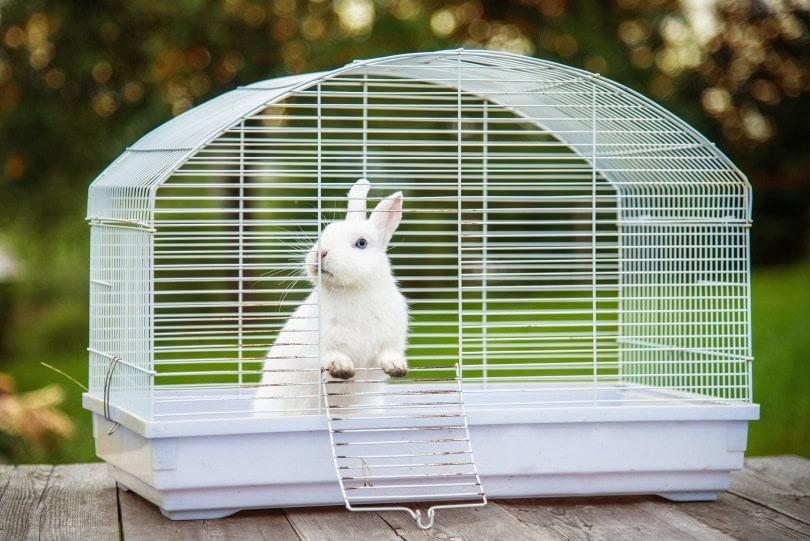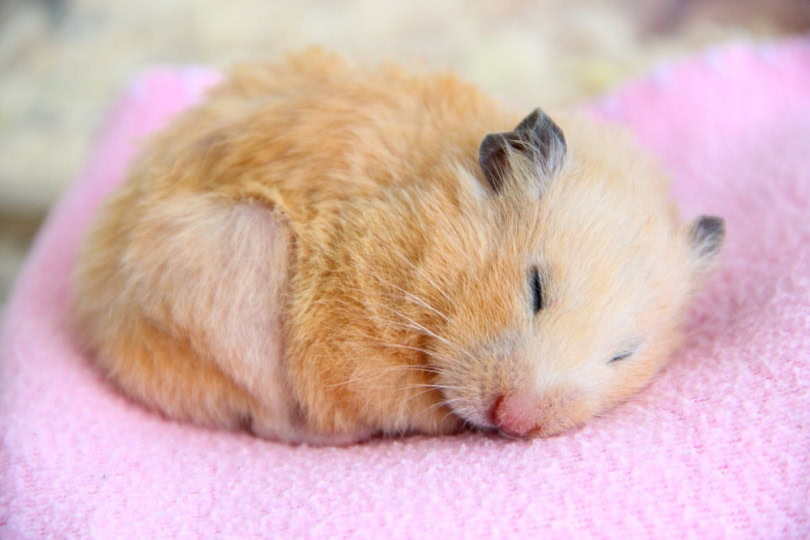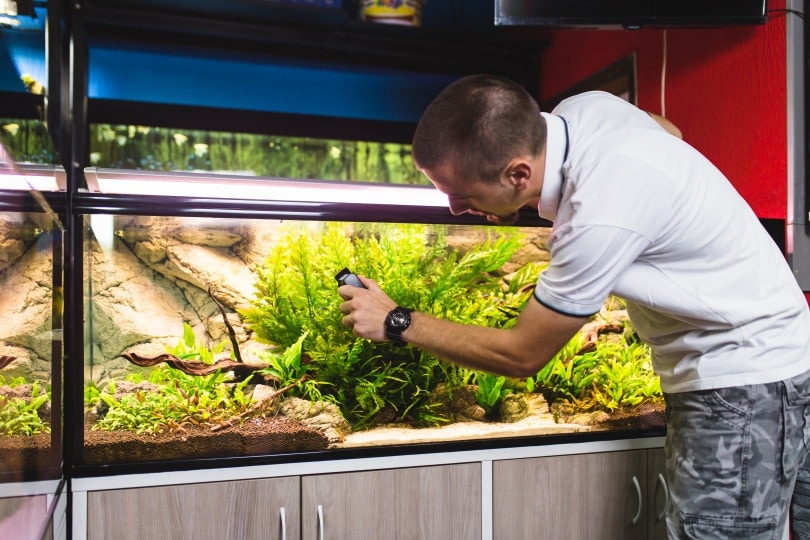VET APPROVED

The information is current and up-to-date in accordance with the latest veterinarian research.
Learn more »Click to Skip Ahead
Before you get a pet rabbit, when you’re just imagining how great it will be to have such a cuddly and cute pet, the idea of taking care of them may seem so simple. How hard can it be? There can’t be that much involved! Those dreams fade quickly once you’re faced with the reality of rabbit care. Your rabbit requires thorough ongoing care, with special attention to their diet and husbandry, as well as keeping their hutch or crate clean.
So, you know you need to clean out your rabbit’s hutch and keep it clean. But how often do you have to attend to it if you want it to stay comfortably livable for your furry friend? A lot more than you might realize. Put simply, you’ll have to do some work on it every day, but the major cleanings can be spread out to once a week. By the end of this article, you’ll know exactly when you need to clean your rabbit’s enclosure, what you’ll need to do, and how to make it happen.

How Often Should You Clean Your Rabbit’s Hutch?
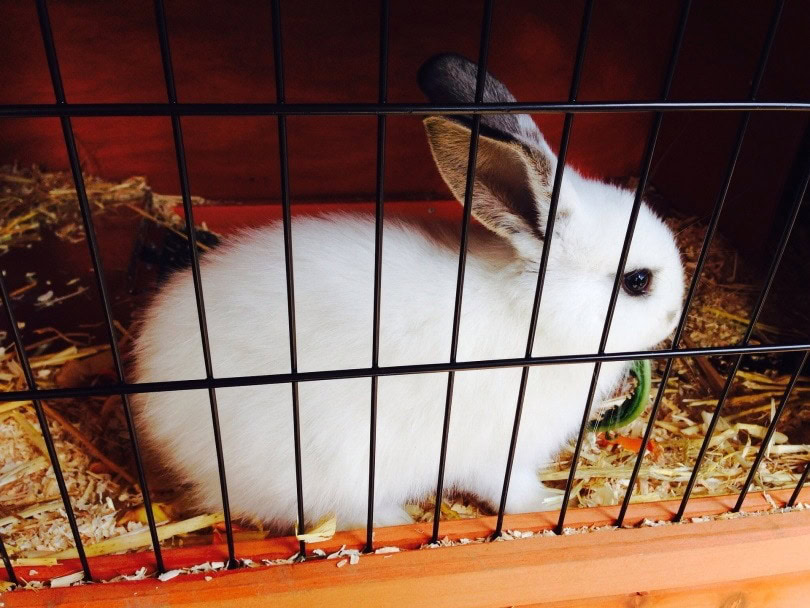
Rabbits defecate frequently, producing a significant amount of feces. Fortunately, it doesn’t have a strong odor like that of cats or dogs. If you want to prevent the build up of feces and its unsightliness, your rabbit’s enclosure will require daily attention in the form of spot cleaning.
Luckily, spot cleaning doesn’t take long, but it’s not very thorough either. Once a week, the enclosure will need some deeper love as you perform a deep cleaning to keep it sanitary. Between daily spot cleanings and weekly deeper cleanings, you’ll be able to stay on top of the mess and keep your rabbit’s living conditions sufficiently safe and hygienic.
Spot Cleaning
Spot cleaning is a light, basic cleaning that you perform every day. It doesn’t take long, but it helps to keep the mess in your rabbit’s cage under control. As a bonus, the daily cleaning you do adds up, making it much easier to complete your weekly deep cleaning.
During spot cleaning, you’ll only be doing the basic, important tasks. For instance, you’ll want to remove the visible waste and get rid of any uneaten food, so it doesn’t rot.
Deep Cleaning
Your deep cleaning will only need to happen once each week. If you’ve kept up on your daily spot cleanings, your deep cleaning shouldn’t be too big of a deal. During the deep cleaning, you’ll be thoroughly cleaning and disinfecting the entire enclosure, so you’ll want to block out a bit of time on your schedule, as it’s going to take much longer than your short daily cleanings.
While deep cleaning, you’ll be removing and cleaning or replacing everything. You’ll need new bedding for your bunny, the toys need to be cleaned, the cage needs to be disinfected, and so on.

What Needs to Be Spot Cleaned?
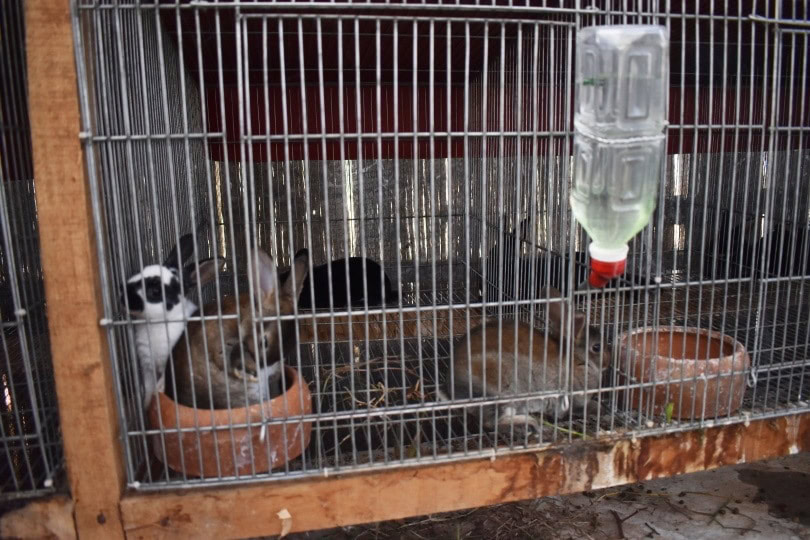
Spot cleaning isn’t a very involved process, but you still want to be thorough when you do it. The following items should be cleaned every day during your spot cleanings:
Leftover Foods
Your rabbit might have food left over from the day before, or there may be pieces that fell during eating and never got picked up. You must remove these to ensure they don’t start rotting or molding, which could be harmful to your rabbit if it were to eat them in this state. While you’re removing the old food, wash out your rabbit’s food bowls to keep them hygienic.
Litter Box
Check the litter box for any waste. Remove any clumps using a scoop. If needed, you can replace the litter you removed. Also, be sure to check around the litter box for any spills and additional clumps that might have been pushed out.
Spills
Look around the cage for any spills or wet spots where the bedding might be soggy. It could become moldy if left in the cage, so be sure to remove any soiled bedding and replace it.
Water Bottle
Rabbits require constant access to clean water, and to ensure your rabbit has that, you’ll have to keep the bottle clean. Your best bet is to get a bottle brush, which will make the task of cleaning your rabbit’s water bottle quick and simple. Bottle brushes like the Lixit Bottle Cleaning Brush are cheap and will save you loads of headaches.

What Does a Deep Cleaning Entail?
Your daily spot cleanings will do a good job of keeping the cage relatively clean without investing too much time each day. Even still, you’ll notice that mess and odors seem to accumulate around your rabbit. To prevent the eventual overtaking of the cage by a gradual buildup of waste and foul odors, you’ll need to do a deep cleaning of the entire enclosure once each week.
Here’s what you’ll need to do:
Remove All Bedding
Regardless of what type of bedding or substrate you use for your rabbit, it needs to be cleaned or replaced each week. Some people use fabric, in which case, you’ll need to wash it and replace it. For other types of beddings, just remove all of the bedding and replace it.
Remove and Clean Toys and Accessories
All of your rabbit’s toys and accessories, including dishes, water bottles, and other items, need to be removed during your deep cleaning. Wash them in soap and hot water. You can even let them soak in the soapy water while you perform the rest of the deep cleaning.
Clean the Cage with a Cleaning Solution
Using a commercial pet-specific cleaning product, you’ll need to clean down the entire cage. The best time to do this is after you remove all the bedding, but before you replace it. Anecdotally white vinegar may help to remove the urine residue from your rabbit’s waste.
Disinfect
While the cage is still empty, you’ll need to disinfect it, which goes further than just cleaning. You’ll want to spray down the entire cage and all of the essentials, allowing them to soak for about 30 minutes to ensure that any bacteria and germs are neutralized. Make sure your rabbit is well out of the way in a different secure room or another enclosure, safe from other pets, and from the potentially strong or irritant disinfectant solutions. Ventilate or air the area thoroughly after cleaning and ensure to use a product safe for rabbits.
Replace Litter and Clean the Litter Box
Your rabbit’s litter box is going to be a source of unhygienic smells if you don’t give it regular attention. If you’ve kept up with spot cleaning the litter each day, the litter box probably won’t look too bad. Don’t let this fool you! The odors will come very soon if you don’t replace the litter. So, regardless of how it looks, throw out the old litter during each weekly cleaning and replace it with fresh litter. Before putting the new litter in, make sure to thoroughly clean out the litter box, as it’s a haven for bacteria and foul odors.

Why It’s Important to Keep Your Rabbit’s Hutch Clean
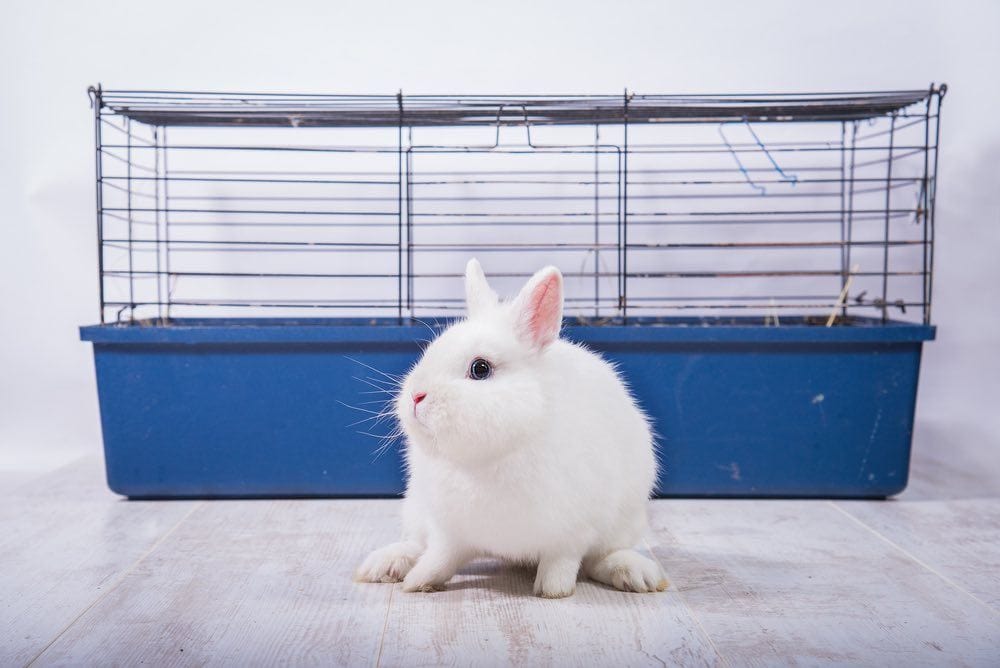
Keeping a rabbit is a surprising amount of work. Most people don’t realize just how much time and effort it will require until they actually own a rabbit and are responsible for meeting all of their needs, which are many. One of the most important needs is providing a clean and safe living area.
If your rabbit’s enclosure isn’t kept clean, it could have a serious impact on your rabbit’s overall lifespan. Plus, a dirty living space will lower your rabbit’s quality of living. In general, this results in poor health for your bunny buddy and could cause your rabbit to be depressed, stressed, and anxious, which will degrade their health even further.
Aside from the psychological impact of living in filth, there’s a notable physical health impact. Your rabbit’s waste will build up quickly, and if you allow that to happen, your rabbit could get sick from it. The waste will also attract all sorts of other unwanted pests, especially if your rabbit’s hutch is kept outside.
When your rabbit is living in a clean and healthy environment, they will be much healthier and happier. You’ll have a more vibrant, alive pet, instead of one that’s unhappy and unhealthy.

Make a Habit of It
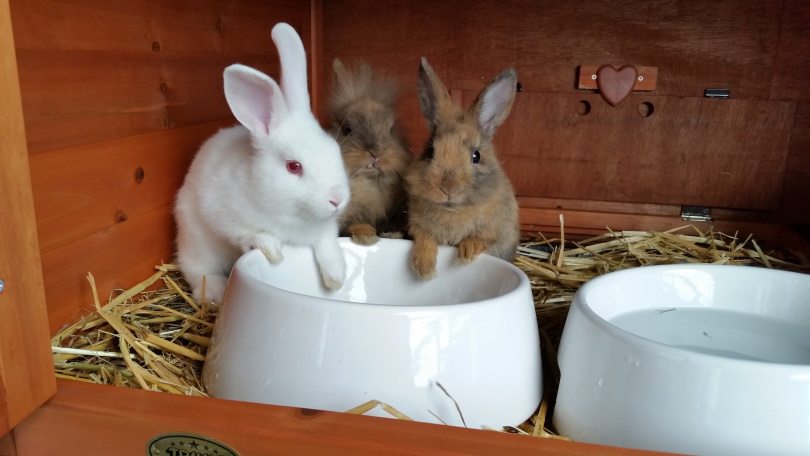
Don’t let this overwhelm or intimidate you. It might sound like a lot of work on the surface, but the truth is, if you remember to perform your spot cleanings each day, your weekly cleanings won’t be too bad. But for both cleanings, you’ll want to schedule out specific times to perform them, and turn them into habits.
Each day, you should spot clean your rabbit’s cage at about the same time. This will allow you to make it part of your routine; something that’s programmed into your schedule, rather than something you have to think about doing. This is also a great opportunity to monitor your rabbit’s feces and urine, being able to pick up on any changes quickly.
The same is true for the weekly cleaning. It’s easy to look at it as an unpleasant task and try to shy away from it, but instead, you should schedule out the time for your weekly cleaning, and repeat it on the same day at the same time each week.
Maybe, you could set Sunday mornings as your deep-cleaning day, and every Sunday morning wake up and get it done before the day really starts. Whenever you choose to do it, routinizing these cleanings will make it much easier for you. Remember, you’re in this for the long haul. Your rabbit could be around for 8-12 years in some cases, so you better get used to performing these cleanings!
Monitoring Your Rabbit’s Enclosure
One big benefit of cleaning your rabbit’s enclosure each day is that you’ll get to keep a close eye on what’s going on with your rabbit and their living space. If anything is amiss, you’ll know right away, so you’ll be able to take immediate action. Certain changes could indicate that your rabbit is dealing with underlying health issues. Daily interaction means you might notice those signs right away and be able to attend to the problem before it grows into something major.

Conclusion

Cuddling with our pets and enjoying them is great, but the real truth of pet ownership is that there’s a lot of work and care involved. Cleaning your rabbit’s cage might not seem like the most glamorous part of owning a rabbit, but it’s certainly one of the most important.
If you’re going to keep a rabbit, then cleaning their cage is a part of life you’ll need to get comfortable with, as you’ll be doing it every day for the duration of your rabbit’s life. Thankfully, deep cleanings only need to be done once each week. Those daily cleanings are just little spot cleanings, to prevent the mess from accumulating too fast.
Featured Image Credit: Rita_Kochmarjova, Shutterstock
